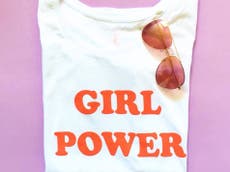The Independent's journalism is supported by our readers. When you purchase through links on our site, we may earn commission.
Google searches for International Men's Day are through the roof – the sexist society we live in can't even let women have one day
The fundamental problem is space: space is seats at a boardroom table, football pitches, and on the internet without fear our bodies, our safety, our minds, our emotions, our lives
Among the wonderful tweets on my feed this morning celebrating International Women’s Day, was one announcing the fact that “International Men’s Day” is the most searched for term on International Women’s Day. My first reaction was “of course it is”.
If you think this year is a one-off, I’m here to pop your bubble. The same thing happened last year. And the year before that, and before that, stretching back across the last ten years. A helpful Reddit user, R1zzles, even created a graph to illustrate the ridiculousness of it.
I am all for an International Men’s Day, especially as it falls in November – a month which has been used to highlight men’s mental health issues, the horrific male suicide rate, and prostate cancer. The latter cause is especially close to my heart as my dad died from terminal prostate cancer less than two years after being diagnosed.
But sexism, historically and currently, disproportionately hurts women. Caroline Criado-Perez has explored how the modern world is built for the average man (caucasian, aged 25 to 30, weighing 70kg), rather than the average woman in her recent book Invisible Women. People talk about the structural barriers that women face, and that’s because the structures themselves are simply not built for women. Don’t worry though, they are all relatively minor things like seatbelts and body armour.
The chronic dismissal of women’s pain has also been revealed in recent years. On average it takes seven and a half years to diagnose endometriosis, despite it being a relatively common condition (one in 10 women are affected). Other conditions manifest differently in women and are, therefore, underdiagnosed like heart attacks and autism. Women of colour are even less likely to be diagnosed than white women, especially when it comes to eating disorders.
Speaking of our bodies, a right to control them as we see fit might be a nice perk. Gloria Steinem famously said that “if men could get pregnant, abortion would be a sacrament”. I also doubt the “husband stitch” would exist.
When someone violates that bodily agency, it’s fairly reasonable, I think, for them to receive punishment. But while in 2017, women were five times more likely than men to have experienced some type of sexual assault, up to 80 per cent of women didn’t report their “experiences” (ie crimes).
Victim-blaming is still rife, both implied and actual. My mum didn’t allow me to take taxis, public transport or walk alone at night, nor did the mothers of my female friends, which is a slight problem when you’re all sharing a taxi. Such behaviour – while unfair – is not unreasonable, but it essentially puts a curfew on women.
The fundamental problem is space: actual and metaphorical. We see this in the game of “Patriarchy Chicken” that Dr Charlotte Riley recently played, when she was fed up of having to move for men: “a man in a suit was so confused that I didn’t step out of the way for him that he stopped dead in front of me and flapped his mouth like a fish,” she tweeted. Similarly, catcalling is penetrating a woman’s space when she is in public. Sexual assault is a power grab.
Space is seats at a boardroom table, football pitches, and on the internet without fear our bodies, our safety, our minds, our emotions, our lives. Space is being able to move around and be respected because we are humans too, not because we are someone’s sister, wife, or mother.
This is a snapshot of the problems that face women in the UK. Men have to cede space for equality to be achieved and that’s what scares people (not just men, women can also be sexist). All women are asking for today is the space to speak about their experiences and strive for equality without the patriarchal agenda which rules the world butting in. Just a bit of space for one day – and even that seems too much for people to accept.
Studies have demonstrated that people think that women take up much more space than they actually do.
Go and google them and then come back and debate me.That might at least change the top searched terms.



Join our commenting forum
Join thought-provoking conversations, follow other Independent readers and see their replies